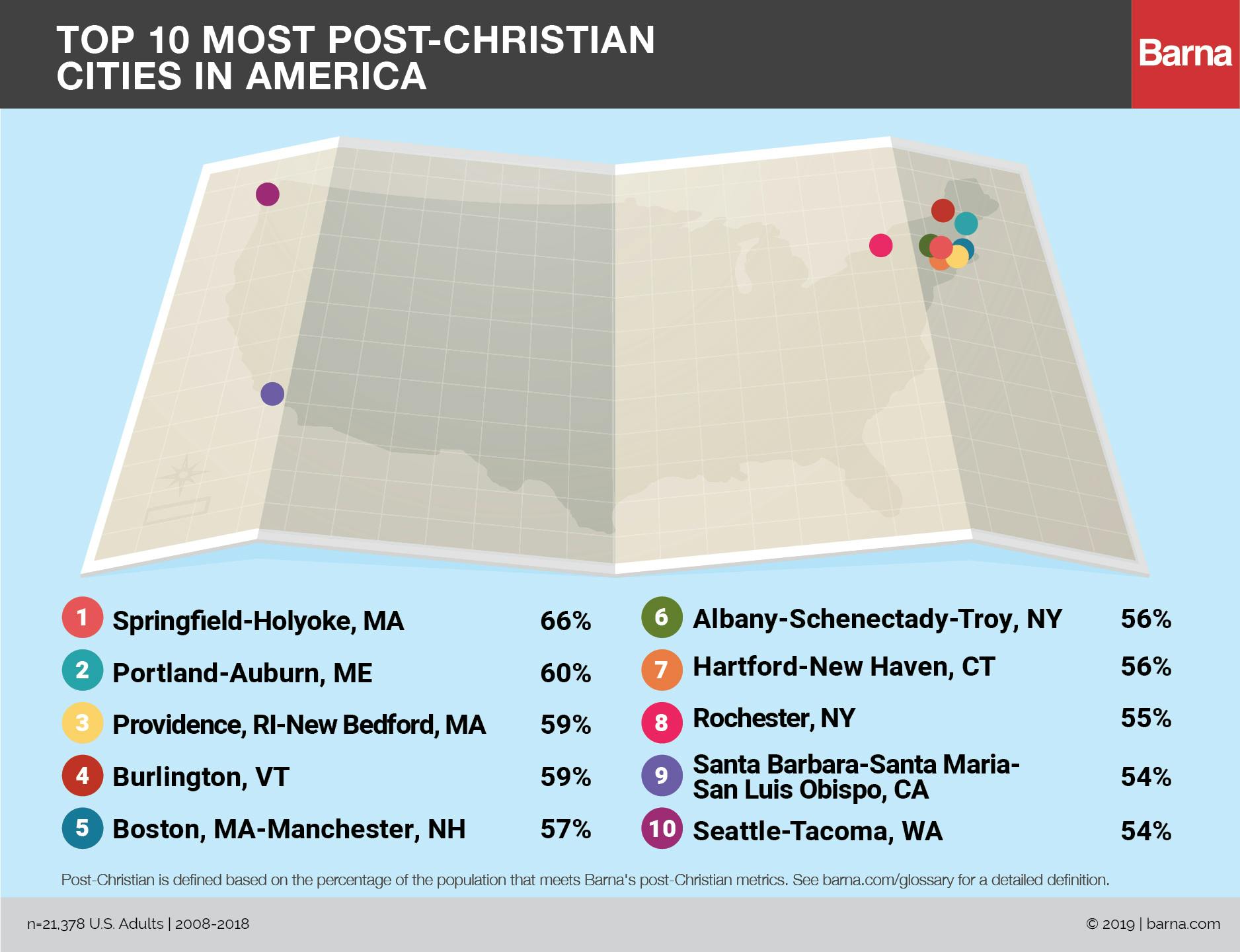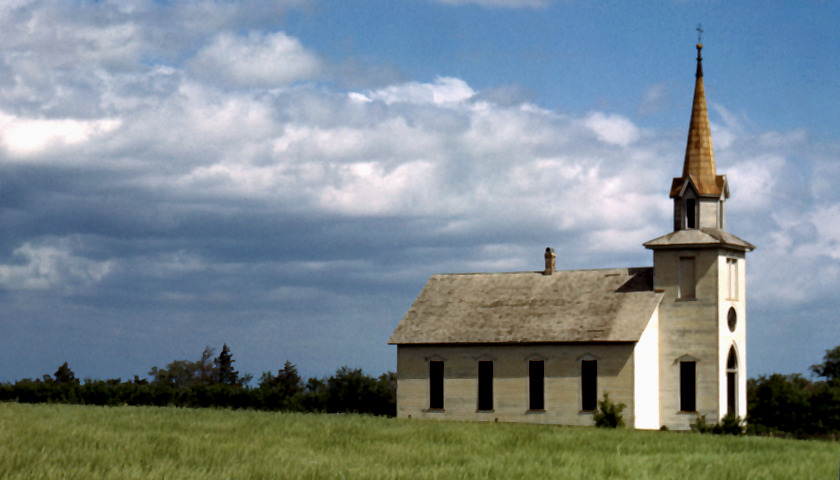Cities in eight states from Maine to Massachusetts topped a list of the “Most Post-Christian Cities in America,” a new study released this month found. The Northeast region stands in stark contrast to the sole Tennessee city of Knoxville who barely cracked the top 100 – coming in at #99.
The study, conducted by Barna research, is part of an ongoing survey of Americans based on a random sample of 21,378 adults conducted over a ten-year period.

To be identified as post-Christian, an individual had to meet nine or more of the following factors:
– Do not believe in God
– Identify as atheist or agnostic
– Disagree that faith is important in their lives
– Have not prayed to God (in the last week)
– Have never made a commitment to Jesus
– Disagree the Bible is accurate
– Have not donated money to a church (in the last year)
– Have not attended a Christian church (in the last 6 months)
– Agree that Jesus committed sins
– Do not feel a responsibility to “share their faith”
– Have not read the Bible (in the last week)
– Have not volunteered at church (in the last week)
– Have not attended Sunday school (in the last week)
– Have not attended religious small group (in the last week)
– Bible engagement scale: low (have not read the Bible in the past week and disagree strongly or somewhat that the Bible is accurate)
– Not Born Again
Each city was then evaluated based on the percentage of its population that is considered post-Christian.
The Twin Cities of Minneapolis and St. Paul ranked 48th on the list with 44 percent of the area’s population meeting nine or more of the post-Christian metrics. That number is up from Barna research’s 2017 study, which found that 41 percent of the population was post-Christian.
Among Ohio’s cities, Toledo was highest on the list in the number 35 spot and 47 percent of its residents are considered post-Christian. In Columbus, 42 percent of residents qualify as post-Christian, followed by Cleveland at 39 percent, and Dayton and Cincinnati – both tied at 38 percent.
Southern states like Tennessee were notably lower on the list. The only Tennessee city to make the top-100 list was Knoxville, where 32 percent of residents are considered post-Christian.
According to the survey, Detroit is the most post-Christian city in Michigan with 48 percent of residents fitting the description.
– – –
Anthony Gockowski is managing editor of Battleground State News, The Ohio Star, and The Minnesota Sun. Follow Anthony on Twitter. Email tips to [email protected].






I was born in Knoxville in 1960 and have lived here my entire life. It is true that Knoxville is becoming ever more liberal and Godless. Most of the large Church (500 or more in Sunday morning worship) in South Knoxville are now well under 100. It would have been unthinkable to have a gay parade with the mayor at its head – just 10 years ago. I underestimated how much damage a liberal paper (the Sentinel) and a liberal university (Univ. Tenn.) and a massive influx of Yankees could do.
I am curious as to what the grand total of all cities examined was. The list above only gives us the top 100 cities. How many did not make the list? I am surprised that Nashville did not make it when Knoxville did. Is Knoxville city less conservative than Metro Nashville? I don’t know the answer, but it would not totally surprise me given Knoxville and East Tennessee’s unique history in the state and in the entire former Confederate region of the U.S.
Knoxville and Knox County had opposed secession like most of the rest of the eastern third of Tennessee and supported unsuccessful attempts to secede from the Confederacy just as West Virginia had succeeded in doing. The Republican Party that materialized from this part of Tennessee, while generally not liberal or leftist, was still well to the left of the Goldwater- and Reagan-type of Republicanism that would envelope most of the rest of the Southeastern U.S. East Tennessee’s two Congressman during the early 20th century supported federal anti-lynching laws, voted with Taft Isolationists during the early 1940’s (and briefly again between 1948 and 1952 where both Congressmen had voted against peacetime male conscription). They both refused to sign the pro-segregation “Southern” Manifesto of 1956 and supported the 1957 and 1960 civil rights laws with impunity.
Knoxville City in 1962 deserted Goldwater for Johnson while Knox County gave only just over half of its vote to Goldwater that year. Indeed, LBJ did better in East Tennessee (despite barely losing it) than Franklin Roosevelt and any other Democrat did since the Civil War.
In 2000, Presidential candidate Al Gore, Jr., while losing to Bush, Jr., did better in East Tennessee than any of the Congressional Democrats running in East Tennessee that year. This was a reversal of the trend found in places like Alabama where up-ticket Democrats normally did worse than down-ticket ones.
Perhaps these early political developments could at least partly explain the city of Knoxville’ unpredictability in embracing certain parts of liberalism.
When I lived in Knoxville ca. forty years ago, the city already had some liberal and leftist enclaves such as Fort Sanders and Bearden. The University of Tennessee had a strong anti-war contingent during the sixties and early seventies where protesters got into a confrontation with Nixon at a Billy Graham rally.
Maybe the above facts might explain Knoxville’s eccentricities.
Having lived in the Knoxville area since 1977 I would offer a little clarity to this rating of cities as post-Christian. If you take just the city limits of Knoxville and exclude the rest of Knox County then the article ranking Knoxville in the top 100 MIGHT have a point. Knoxville City has been a Democrat hub for many years and the current city Mayor loves to do things like lead in the Gay Pride Parades or support the removal of the Ten Commandments from government buildings. Like much of America, we have a blue city but a red county. That is the only way I can even come close to believing such a ranking for Knoxville.